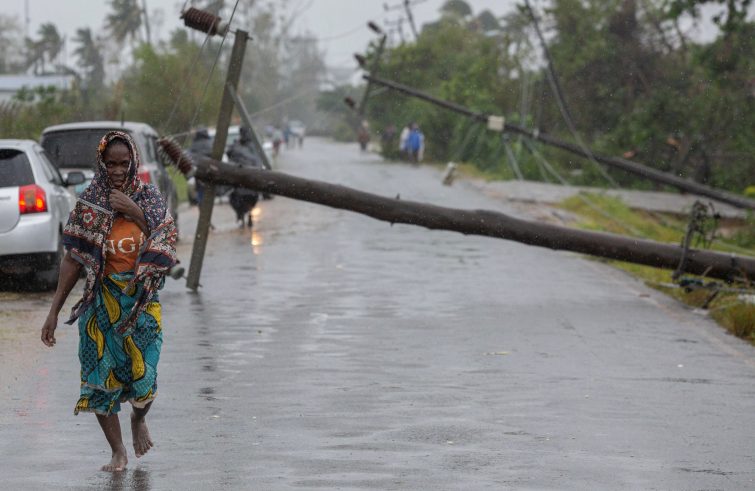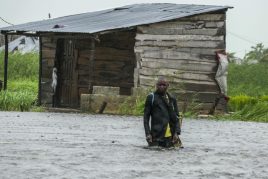
The death toll in southern Africa, hit by Cyclone Freddy, has exceed 400, and it continues to rise with each passing hour. Many are still missing under the water and the mud in Malawi’s southern regions. Mozambique has also been affected, although to a lesser degree. “The much-feared tropical cyclone has hit and flooded the whole of southern Malawi. It came as a shock to me: I feel a deep connection with this population, living in extreme poverty, and our Comboni confreres also live in the country. Father Antonio Guarino, a Comboni missionary in Zambia, is grieved by this umpteenth tragedy. The truth is that this is no ordinary country, in fact Malawi ranks 172nd out of 188 countries in the Human Development Index, and its survival is hanging by a thread.
Agriculture on its knees. “The country had been desperately fighting against a cholera outbreak, with thousands of cases, and now Cyclone Freddy: there were other cyclones in the past, but never as devastating as this one,” the missionary explained.
“Extreme hunger is forecast for the coming months – he said – not least because the season’s harvest was washed away by the floods.”
The cyclone caused widespread devastation. “The production and harvest of corn, rice and sorghum is seriously at risk: the cyclone not only brings death and destruction, it leaves its mark for months.”
The bishops’ appeal. Speaking over the phone, the missionary pauses before going on to describe the tragic disaster that hit Malawi’s Blantyre, Chikwawa, Chiradzulu, Mulanje and Mwanza regions. The death toll continues to rise as the dead bodies of missing persons are pulled out of the floodwaters. The Malawi Bishops’ Conference issued a statement a few days ago calling “on all people, especially those in flood and disaster-prone areas to move to safer grounds; to be alert and pay heed to all official warnings and instructions that are coming from our meteorological and weather experts.” The bishops further urge “all Catholics, and indeed people of goodwill, to stand and feel with the victims of this devastating cyclone and immediately start to donate whatever they can, in form of money and in kind,” in response to the disaster. The communiqué is signed by seven bishops, including the president of the local Bishops’ Conference, George Desmond Tambala.
 “Houses have collapsed…”. “Malawis are digging through the mud in search of dead bodies buried under the mud,” says Father Antonio. The local Church took action immediately and allocated an initial sum – it was the first to intervene, but it certainly won’t be enough.” The Comboni priest sent photos and videos he received from his confreres to the editorial office of Popoli e Missione: in one of the videos shot by local residents, a house can be seen literally “melting”, as if it were made of paper, crushed by the torrent of water and mud flowing through it. Terrifying scenes… “Our mission is not very far from the affected area, but the cyclone did not hit that far. Our brethren, who come from those areas, said their families’ houses were washed away by the water.”
“Houses have collapsed…”. “Malawis are digging through the mud in search of dead bodies buried under the mud,” says Father Antonio. The local Church took action immediately and allocated an initial sum – it was the first to intervene, but it certainly won’t be enough.” The Comboni priest sent photos and videos he received from his confreres to the editorial office of Popoli e Missione: in one of the videos shot by local residents, a house can be seen literally “melting”, as if it were made of paper, crushed by the torrent of water and mud flowing through it. Terrifying scenes… “Our mission is not very far from the affected area, but the cyclone did not hit that far. Our brethren, who come from those areas, said their families’ houses were washed away by the water.”
Voices of despair. Al Jazeera pan-Arab TV correspondent, Fahmida Miller, reporting from Mulanje in the suburbs of Blantyre, Malawi’s commercial district, describes widespread anger and distress at the delays in rescue operations: hundreds of people are still missing. Local residents came together in emergency response groups. “There are no rescue teams” – they denounced – “no government officials have come here to help us,” David Phiri, a local resident, told Al Jazeera. “There are just ordinary people, ordinary survivors helping other survivors,” he says.
“That’s the sad thing: such a poor country, among the poorest in the United Nations rankings for poverty, severely tried by the outbreak of disease, is now facing this ordeal,” Father Guarino further remarks.
An outbreak of cholera in Africa has affected more than 40,000 people over the last few months, according to the World Health Organisation, with more than half of these cases occurring in Malawi and 15 per cent in Mozambique. Once the health emergency is over, the population will have to face a new one: and this time hunger and basic needs will persist for a very long time.
(*) editorial staff, “Popoli e Missione”












